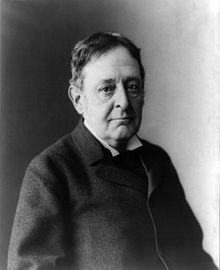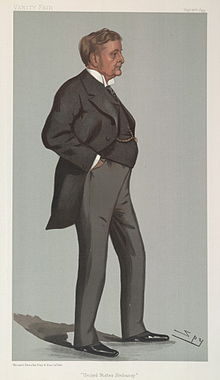- Joseph Hodges Choate
-
Joseph Hodges Choate 
Joseph Hodges Choate, 1898Born Salem, Massachusetts
January 24, 1832Died May 14, 1917 (aged 85) Parents George Choate Relatives George C. S. Choate, brother
Rufus Choate, first cousin once removedSignature 
Joseph Hodges Choate (January 24, 1832 - May 14, 1917), was an American lawyer and diplomat.
Contents
Biography
He was born in Salem, Massachusetts on January 24, 1832. He was the son of physician George Choate and the brother of George C. S. Choate. His father's first cousin was Rufus Choate. After graduating from Harvard College in 1852 and Harvard Law School in 1854, he was admitted first to the Massachusetts (1855) and then (1856) to the New York bar, and entered the law office of Scudder & Carter in New York City.
His success in his profession was immediate, and in 1860 he became junior partner in the firm of Evarts, Southmayd & Choate, the senior partner in which was William M. Evarts. This firm and its successor, that of Evarts, Choate & Beaman, remained for many years among the leading law firms of New York and of the country, the activities of both being national rather than local.
On October 16, 1861 he married Caroline D. Sterling.[1]
During these busy years, Choate was associated with many of the most famous litigations in American legal history, including the Tilden, AT Stewart, and Stanford will cases, the Kansas prohibition cases, the Chinese exclusion cases, the Maynard election returns case, and the Income Tax Suit. In 1871 be became a member of the Committee of Seventy in New York City, which was instrumental in breaking up the Tweed Ring, and later assisted in the prosecution of the indicted officials. He served at president of the American Bar Association, the New York State Bar Association, and the New York City Bar Association. In the retrial of the General Fitz-John Porter case he obtained a reversal of the decision of the original court-martial.
His greatest reputation was won perhaps in cross-examination. In politics he allied himself with the Republican Party on its organization, being a frequent speaker in presidential campaigns, beginning with that of 1856. He never held political office, although he was a candidate for the Republican senatorial nomination against Senator Thomas C. Platt in 1897. In 1894 he was president of the New York state constitutional convention.
He was appointed, by President McKinley, U.S. Ambassador to the United Kingdom to succeed John Hay in 1899, and remained in this position until the spring of 1905. In England he won great personal popularity, and accomplished much in fostering the good relations of the two great English-speaking powers. He was one of the representatives of the United States at the second Peace Congress at the Hague in 1907.
Upon the outbreak of the World War I, he ardently supported the cause of the Allies. He severely criticized President Wilson's hesitation to recommend America's immediate cooperation, but shortly before his death retracted his criticism. He was chairman of the mayor's committee in New York for entertaining the British and French commissions in 1917. His death was hastened by the physical strain of his constant activities in this connection. He died on May 14, 1917.[2]
Works
- Abraham Lincoln and Other Addresses in England (1910)
- American Addresses (1911)
Legacy
Several of his notable public addresses have been published. The Choate Story Book (1903) contains a few of his addresses and after-dinner speeches, and is prefaced by a brief biographical sketch. His country house, Naumkeag, was designed by Stanford White and now open as a nonprofit museum in Stockbridge, Massachusetts.
Diplomatic posts Preceded by
John HayU.S. Ambassador to Great Britain
1899–1905Succeeded by
Whitelaw ReidNotes
- ^ "Joseph H. Choate, 80, Married 50 Years. Celebrates Golden Wedding with Mrs. Choate and Relatives at Naumkeag in Berkshires." (PDF). New York Times. 1911-10-16. http://query.nytimes.com/mem/archive-free/pdf?res=9E07E1D61531E233A25755C1A9669D946096D6CF. Retrieved 2008-12-17.
- ^ "Joseph Hodges Choate Dies Suddenly.". New York Times. May 15, 1917. http://query.nytimes.com/gst/abstract.html?res=9A01E0DC123AE433A25756C1A9639C946696D6CF. Retrieved 2009-02-16. "Joseph H. Choate died suddenly late last night at his residence, 8 East Sixtythird Street, of a heart attack. He had complained of feeling ill during the day and had retired early, but there was no physician with him when the end came. He breathed his last at 11:30. Mrs. Choate and their daughter, Miss Mabel, were at his side."
References
 Chisholm, Hugh, ed (1911). "Choate, Joseph Hodges". Encyclopædia Britannica (11th ed.). Cambridge University Press.
Chisholm, Hugh, ed (1911). "Choate, Joseph Hodges". Encyclopædia Britannica (11th ed.). Cambridge University Press. "Choate, Joseph Hodges". Encyclopædia Britannica (12th ed.). 1922. This work in turn cites:
"Choate, Joseph Hodges". Encyclopædia Britannica (12th ed.). 1922. This work in turn cites:
- Edward Sandford Martin, The Life of Joseph Hodges Choate (1920)
Further reading
 Works written by or about Joseph Hodges Choate at Wikisource
Works written by or about Joseph Hodges Choate at Wikisource
External links
 Media related to Joseph Hodges Choate at Wikimedia Commons
Media related to Joseph Hodges Choate at Wikimedia Commons
 United States Ambassadors to the United Kingdom
United States Ambassadors to the United Kingdom 
Ministers Plenipotentiary to
the Court of St. James's
1785–1811John Adams 1785–1788 · Thomas Pinckney 1792–1796 · Rufus King 1796–1803 · James Monroe 1803–1807 · William Pinkney 1808–1811 · Jonathan Russell (chargé d'affaires) 1811–1812
Envoys Extraordinary and
Ministers Plenipotentiary to
the Court of St. James's
1815–1893John Quincy Adams 1815–1817 · Richard Rush 1818–1825 · Rufus King 1825–1826 · Albert Gallatin 1826–1827 · James Barbour 1828–1829 · Louis McLane 1829–1831 · Martin Van Buren 1831–1832 · Aaron Vail (chargé d'affaires) 1832–1836 · Andrew Stevenson 1836–1841 · Edward Everett 1841–1845 · Louis McLane 1845–1846 · George Bancroft 1846–1849 · Abbott Lawrence 1849–1852 · Joseph R. Ingersoll 1852–1853 · James Buchanan 1853–1856 · George M. Dallas 1856–1861 · Charles Adams, Sr. 1861–1868 · Reverdy Johnson 1868–1869 · John Lothrop Motley 1869–1870 · Robert C. Schenck 1871–1876 · Edwards Pierrepont 1876–1877 · John Welsh 1877–1879 · James Russell Lowell 1880–1885 · Edward J. Phelps 1885–1889 · Robert Todd Lincoln 1889–1893
Ambassadors Extraordinary
and Plenipotentiary to
the Court of St. James's
1893–presentThomas F. Bayard, Sr. 1893–1897 · John Hay 1897–1898 · Joseph Choate 1899–1905 · Whitelaw Reid 1905–1912 · Walter Page 1913-1918 · John W. Davis 1918–1921 · George Harvey 1921–1923 · Frank B. Kellogg 1924–1925 · Alanson B. Houghton 1925–1929 · Charles G. Dawes 1929–1931 · Andrew W. Mellon 1932–1933 · Robert Bingham 1933–1937 · Joseph P. Kennedy 1938–1940 · John G. Winant 1941–1946 · W. Averell Harriman 1946 · Lewis W. Douglas 1947–1950 · Walter S. Gifford 1950–1953 · Winthrop W. Aldrich 1953–1957 · John Hay Whitney 1957–1961 · David K. E. Bruce 1961–1969 · Walter H. Annenberg 1969–1974 · Elliot L. Richardson 1975–1976 · Anne Armstrong 1976–1977 · Kingman Brewster, Jr. 1977–1981 · John J. Louis, Jr. 1981–1983 · Charles H. Price II 1983–1989 · Henry E. Catto, Jr. 1989–1991 · Raymond G. H. Seitz 1991–1994 · William J. Crowe 1994–1997 · Philip Lader 1997–2001 · William Stamps Farish III 2001–2004 · Robert H. Tuttle 2005–2009 · Louis Susman 2009–
Categories:- 1832 births
- 1917 deaths
- American diplomats
- American lawyers
- Harvard Law School alumni
- People from Stockbridge, Massachusetts
- United States ambassadors to the United Kingdom
- Choate family
- People from Salem, Massachusetts
Wikimedia Foundation. 2010.

